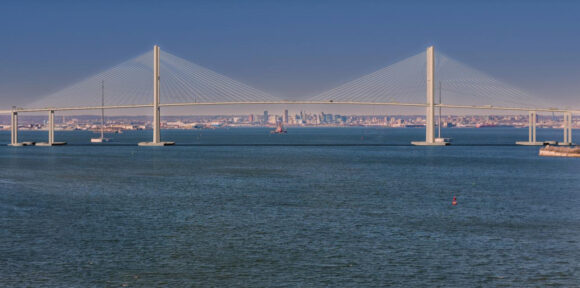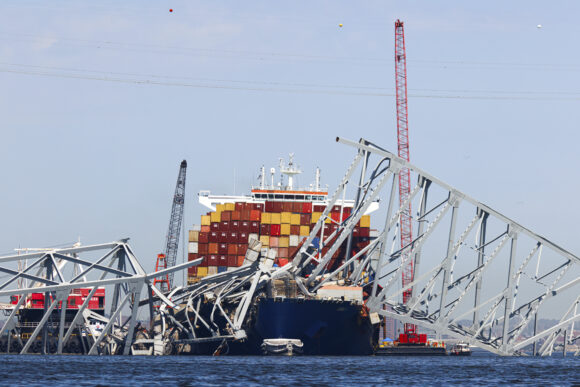The price tag for rebuilding Baltimore’s Francis Scott Key Bridge is now more than double what officials estimated in 2024 right after the bridge was struck by a container shop and collapsed.
The Maryland Transportation Authority (MDTA) yesterday updated the cost estimate to rebuild the bridge to a range of $4.3 billion to $5.2 billion, up from $1.7 billion to $1.9 billion.
The new estimate has an anticipated open-to-traffic date of late 2030, which is two years later than the original timetable.
The major disaster killed six workers and disrupted one of the nation’s busiest ports.
MDTA cited increased material and construction costs and the “robust pier protection system” for the higher projection. The earlier estimates were made less than two weeks after the initial incident in March 2024. MDTA said that a cost estimate typically would not be provided on a project of this size until much later in the design process.
“As design has advanced and pre-construction work progresses, it became clear that material costs for all aspects of the project have increased drastically since the preliminary estimates were prepared less than two weeks after the initial tragedy,” said Acting Transportation Secretary and MDTA Chair Samantha J. Biddle.
The increased length of the main span, now 1,665 feet, is needed to comply with current guidelines for new bridges and the size and cost of the pier protection, for this span adds a “significant cost” to the project, according to MDTA.

The MDTA said it continues to work with the Federal Highway Administration to advance the rebuilding of the bridge. It is also continuing to negotiate with the design builder Kiewit.
The revised estimate comes right before today’s National Transportation Safety Board meeting on the probable cause of the contact of the containership Dali with the bridge and subsequent bridge collapse. NTSB’s board is expected to vote on the findings, probable cause and safety recommendations as well as any changes to the draft final report.
The container ship Dali was moving out of Baltimore Harbor on March 26, 2024, when it experienced a loss of electrical power and propulsion and struck the southern pier supporting the central truss spans of the bridge, which subsequently collapsed. Six construction crewmembers on the bridge at the time of the contact were killed, one construction crewmember was seriously injured, and one crewmember on the Dali was injured.
In a September letter to Maryland Governor Wes Moore, Transportation Secretary Sean P. Duffy raised concerns over reports of escalating project costs and questioned the proposed budget and timeline. Duffy also called out what he said were “unconstitutional” contracting practices that “prioritize race- and gender-based requirements ahead of project completion.”
In his reply, Moore said that the state will continue to work with the Trump Administration to find ways to reduce costs and rebuild faster including contributing state funds and pursuing litigation and insurance settlements.
“We must keep in perspective that 13% of our state’s economy hangs in the balance and that the goods that flow through the Port don’t just touch Marylanders—they reach the farmer in Kentucky, the auto worker in Michigan, and the restaurant owner in Tennessee,” Moore stated.
The NTSB has criticized Maryland officials for failing to conduct a risk assessment of the Key Bridge before it collapsed.
The state has maintained that the collapse was solely the fault of the Dali and its owners.
Top Photo: The collapsed Francis Scott Key Bridge lay on top of the container ship Dali, Monday, April 15, 2024, in Baltimore. The FBI confirmed that agents were aboard the Dali conducting court-authorized law enforcement activity. (AP Photo/Julia Nikhinson)
Was this article valuable?
Here are more articles you may enjoy.



 Fla. Commissioner Offers Major Changes to Citizens’ Commercial Clearinghouse Plan
Fla. Commissioner Offers Major Changes to Citizens’ Commercial Clearinghouse Plan  CFC Owners Said to Tap Banks for Sale, IPO of £5 Billion Insurer
CFC Owners Said to Tap Banks for Sale, IPO of £5 Billion Insurer  State Farm Adjuster’s Opinion Does Not Override Policy Exclusion in MS Sewage Backup
State Farm Adjuster’s Opinion Does Not Override Policy Exclusion in MS Sewage Backup  Preparing for an AI Native Future
Preparing for an AI Native Future 

